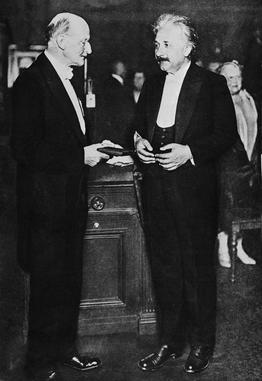
Back ميدالية ماكس بلانك Arabic মাক্স প্লাংক পদক Bengali/Bangla Medalla Max Planck Catalan Medaile Maxe Plancka Czech Max-Planck-Medaille German Μετάλλιο Μαξ Πλανκ Greek Medalla Max Planck Spanish Max Plancki medal Estonian مدال ماکس پلانک Persian Max Planck -mitali Finnish

The Max Planck Medal is the highest award of the German Physical Society (Deutsche Physikalische Gesellschaft), the world's largest organization of physicists, for extraordinary achievements in theoretical physics. The prize has been awarded annually since 1929, with few exceptions, and usually to a single person. The winner is awarded with a gold medal and hand-written parchment.[1][2][3]
In 1943 it was not possible to manufacture the gold medal because the Berlin foundry was hit by a bomb. The board of directors of the German Physical Society decided to manufacture the medals in a substitute metal and to deliver the gold medals later.[4][5]
The highest award of the German Physical Society for outstanding results in experimental physics is the Stern–Gerlach Medal.[6]
- ^ "Official list of recipients of the Max-Planck medal". German Physical Society (in German). Retrieved March 23, 2021.
- ^ "Videoportraits of some recent recipients". German Physical Society (in German). Retrieved March 23, 2021.
- ^ "Historical background and present by-law". German Physical Society (in German). Retrieved March 23, 2021.
- ^ "Replacement of the Max Planck Medal in 1943". teleschach.de (in German). Retrieved March 23, 2021.
- ^ Walter Grotrian, ed. (April 30, 1943). "Verleihung der Planck-Medaille an Pascual Jordan und Friedrich Hund". Verhandlungen der deutschen physikalischen Gesellschaft (in German). Friedrich Vieweg & Sohn. p. 20.
- ^ "Medaglia Stern-Gerlach". German Physical Society (in German). Retrieved March 23, 2021.